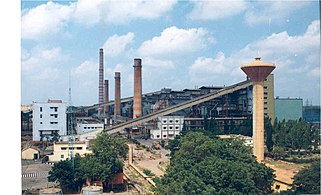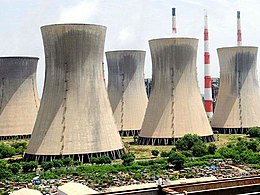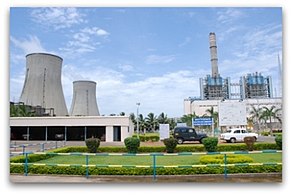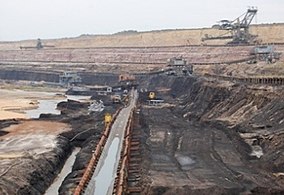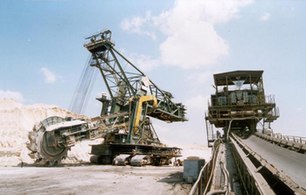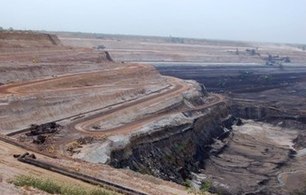NLC India Limited
This article has multiple issues. Please help improve it or discuss these issues on the talk page. (Learn how and when to remove these messages)
|
 | |
 NLC India's corporate office | |
| Company type | Central Public Sector Undertaking |
|---|---|
| BSE: 513683 NSE: NLCINDIA | |
| Industry | Mining and electric utility |
| Founded | 1956 |
| Headquarters | Neyveli, Tamil Nadu, India |
| Products | Lignite and electric power |
| Revenue | |
| Total assets | |
| Total equity | |
| Owner | Ministry of Coal, Government of India[3] |
Number of employees | 11,379 (as on 01.01.2023)[4] |
NLC India Limited (NLC) (formerly Neyveli Lignite Corporation India Limited) is a central public sector undertaking under the administrative control of the Ministry of Coal, Government of India. It annually produces about 30 million tonnes of lignite from opencast mines at Neyveli in the state of Tamil Nadu in southern India and at Barsingsar in Bikaner district of Rajasthan state. The lignite is used at pithead thermal power stations of 3640 MW installed capacity to produce electricity. Its joint venture has a 1000 MW thermal power station using coal. Lately, it has diversified into renewable energy production and installed 1404 MW solar power plant to produce electricity from photovoltaic (PV) cells and 51 MW electricity from windmills.
It was incorporated in 1956 and was wholly owned by the Government of India. A small portion of its stock was sold to the public to list its shares on stock exchanges where its shares are traded.
History
[edit]Lignite deposit was found by chance when some 'brown substance' gushed out with water in T. M. Jambulingam Mudaliar's 620 acre own farm artesian well during 1934. He acted swiftly and contacted the then British Raj, which sent geologists to Neyveli. It was later identified as 'Lignite'. He generously extended substantial portion of the sprawling land-bank for soil exploration. Through his effort and donated his 620 acres land to the Madras Government.[5][6]

NLC has been a forerunner in the country in the energy sector for 62 years, contributing a lion's share in lignite production and significant share in thermal power generation. It was inaugurated by the first Prime Minister Jawaharlal Nehru in 1956.
NLC operates four opencast lignite mines of a total capacity of 30.6 million tonnes per annum (MTPA) at Neyveli and Barsingsar; six lignite based pithead thermal power stations with an aggregate capacity of 3640 MW – at Neyveli and Barsingsar; and a 1000 MW coal based thermal power Station at Thoothukudi, Tamil Nadu through its subsidiary, NLC Tamil Nadu Power Limited (NTPL), a joint venture between NLC and TANGEDCO (equity participation in the ratio of 89:11). NLC recently commissioned a 1x500 MW unit at Neyveli which is also Asia's largest lignite fired boiler.
NLC has also forayed into renewable energy sector with commissioning of a 141 MW Solar Photo Voltaic Power Plant including 1 MW rooftop project at Neyveli and a 51 MW wind energy plant at Kazhuneerkulam village of Tirunelveli district in Tamil Nadu. The company is also setting up 1209 MW Solar Power Projects at Tirunelveli, Virudhunagar and Ramanathapuram districts of Tamil Nadu, of which, 300 MW have been commissioned. NLC is aiming to achieve a total renewable energy capacity of 4251 MW.
NLCIL has a target of becoming a 20,000+ MW company by 2025. Works are under progress for the lignite based Neyveli New Thermal Power Plant (1000 MW), Bithnok TPS and Barsingsar TPS Expansion (each 250 MW). Further, NLC, jointly with the Uttar Pradesh Rajya Vidyut Utpadan Nigam Limited (UPRVUNL), is setting up a 3x660 MW coal based thermal power plant at Ghatampur in Uttar Pradesh, through its subsidiary company Neyveli Uttar Pradesh Power Limited (NUPPL) (equity participation in the ratio of 51:49). Apart from the above, the addition of thermal capacity to the tune of 6040 MW by way of installation of new plants and acquisition of power assets to the tune of 3000 MW is in the pipeline.
NLC has also contributed significantly to the socio-economic development for more than half a century.
The business portfolio of the company is as under:
Chronology of events
[edit]| Year | Event |
|---|---|
| 1828 | Occurrence of peat, a low calorific fuel of coal family near Point Calimere is reported to the then Madras Government, by the sub-collector of Thanjavur Mr. Nelson. |
| 1870 | Peat bogs found in Nilgiris (Peat is considered to be the first stage in the formation of coal from vegetable matter accumulating in swamps). |
| 1877 | W. King of the Geological Survey of India takes up a study of artesian wells around Pondicherry. He comes across a carbonaceous strata. |
| 1884 | Mr.Poilay a French Engineer encounters a Lignite seam in a bore hole at Bahoor, the then French territory. Further exploration along the belt indicates possible lignite deposits at Udharamanickam, Aranganur, and Kanniakoil, near Cuddalore. Lignite deposits are indicated at Kasargod and the Collector of South Kanara reports it to the Board of Revenue. |
| 1934 | Industries Department of the then Government of Madras drills bore holes for tapping artesian water in the neighborhood of Neyveli. Lignite particles encountered are taken as "black - clay" by unlettered workmen engaged in drilling. |
| 1935 | Borewells sunk in Jambulinga Mudaliyar's land in Neyveli and the black particles gushing forth attract the attention of camping geologists engaged in some other mission in the Neyveli Vriddhachalam area. |
| 1937-1938 | Samples of the black substance taken from the above form well sent to the Government of Madras for analysis. |
| 1941 | M/s. Binny & Co., Madras put down four or five bore holes at Aziz Nagar, near Neyveli. Two of them show evidence of lignite deposits, but further work is given up for want of casing pipes and drilling equipment. |
| 1943-1946 | The Geological Survey of India starts drilling operations near Neyveli. Preliminary investigations indicate the existence of lignite to the extent of about 500 tonnes in that area. |
| 1947 | H.K. Ghose, geologist and mining engineer deputised by the Government of India, arrives in Neyveli and starts his operations. |
| 1948 | The first bore holes sunk by Ghose have to be abandoned because of waterlogging and sand - beds. The third one "September 1951" yields samples of lignite. |
| 1949 | Ghose draws an experimental open-cut plan and calls for tenders to start excavation. |
| 1951 | Sinking 175 borewells in a cluster punctuating the chosen area, Ghose proves the existence of about 2000 Million tonnes of Lignite reserves in the area. State Government's Industries and Commerce Department also sinks over 150 borewells south of Vriddhachalam. Paul Eyrich, a mining engineer, is deputised by the Bureau of Mines, United States, to assist the Government of Madras under point four programme to determine the engineering and economic aspects of lignite mining in Neyveli. Upon his recommendation, the US Government sponsors a study on the subject under the direction of V.F.Parry. |
| 1952 | The High Power Committee for Lignite Mining recommends the Pilot Quarry project. |
| 1953 | Pilot Quarry being commissioned by Dr. U. KrishnaRao, Minister for Industries, Madras Government. |
| 1954 | Nehru's visit to the pilot Quarry. Government of India's Committee comprising Mr. C.V. Narasimhan, ICS, Mr. A.C. Guha and Mr. A. Lahiri inspect the Pilot Quarry and submit a report to the Government. Under the Colombo Plan, services of the UK firm PDTS (M/s. Powell Duffryn Technical Services Limited) are availed of for a Project report. |
| 1955 | Neyveli Lignite project's affairs, hitherto managed by the State Government, get passed on to the Central Government with full Financial responsibility. Mr. T.M.S. Mani, ICS, Secretary, Department of Industries, Labour and Co-operation, takes over as the Chief Executive of the project. |
| 1956 | Formation of NLC as a corporate body. NLC is born as a Government-sponsored commercial concern. |
Power projects
[edit]NLC India has five pithead thermal power stations with an aggregate capacity of 4240 MW. Further, NLC India has so far installed 51 wind turbine generators of capacity 1.50 MW each and also commissioned a 140 MW solar photo voltaic power plant in Neyveli, resulting in an overall power generating capacity of 4431 MW (excl. JVs).
| Power plant | Capacity (MW) |
|---|---|
| TPS - I | 600 (retired) |
| TPS - II | 1470 |
| TPS - I Expansion | 420 |
| Barsingsar TPS | 250 |
| TPS - II Expansion | 500 |
| Wind Power Plant | 51 |
| Solar Power Plant | 1404 |
| NTPL | 1000 |
| NNTPP | 1000 |
| Total | 6695 |
Thermal Power Station I
[edit]The 600 MW Neyveli Thermal Power Station-I in which the first unit was synchronized in May 1962 and the last unit in September 1970 consists of six units of 50 MW each and three units of 100 MW each. Power generated from Thermal Power Station-I after meeting NLC's requirements is supplied to TANGEDCO, Tamil Nadu which is the sole beneficiary. Due to the aging of the equipment / high-pressure parts, the life extension programme has been approved by the Indian Government in March 1992 and was completed in March 1999 thus extending the life by 15 years. Given the high grid demand in this region, this power station is being operated after conducting the Residual Life Assessment (RLA) study. The Indian Government sanctioned a 2x500 MW Power Project (Neyveli New Thermal Power Plant – NNTPS) in June 2011 as a replacement for the existing TPS-I.
Thermal Power Station II
[edit]The 1470 MW second thermal power station consists of 7 units of 210 MW each. In February 1978, the Government of India sanctioned the second thermal power station of 630 MW capacity (3 X 210 MW) and in February 1983, the Government of India sanctioned the second thermal power station Expansion from 630 MW to 1470 MW with the addition of 4 units of 210 MW each. The first 210 MW unit was synchronized in March 1986 and the last unit (Unit-VII) was synchronized in June 1993. The power generated from the second thermal power station after meeting the needs of the second mine is shared by the Southern states viz., Tamil Nadu, Kerala, Karnataka, Andhra Pradesh and Union Territory of Puducherry.
Thermal Power Station I - Expansion
[edit]Thermal Power Station-I has been expanded (2 x 210 MW) using the lignite available from Mine-I expansion. The scheme, TPS I Expansion, was sanctioned by the Government of India in February 1996. Unit-I was synchronized in October 2002 and Unit-II in July 2003. The power generated from this station, after meeting the internal requirements, is shared by the Southern States viz., Tamil Nadu, Kerala, Karnataka, and Union Territory of Puducherry.
Barsingsar Thermal Power Station
[edit]The Government of India sanctioned the Barsingsar Thermal Power Station 250 MW (2 X 125 MW) in October 2004. The units were commissioned in December 2011 and in January 2012. The power generated from this station after meeting internal requirements is shared by the DISCOMS of the state of Rajasthan.
Thermal Power Station II - 1st expansion
[edit]This project consists of two units of 250 MW capacity each. Unit-II attained commercial operation in April 2015 and Unit-I in July 2015. The lignite requirement is met through expansion of Mine-II. The steam generators of this project employ eco-friendly circulating fluidised bed combustion (CFBC) technology. This technology has been adopted for 250 MW capacity units for the first time in India.
Gallery
[edit]-
Thermal Power Station-I
-
Thermal Power Station-II
-
Thermal Power Station-I Expansion
-
Thermal Power Station-II Expansion
Mining projects
[edit]NLC has four open cast lignite mines, namely, Mine I, Mine II, Mine IA and Barsingsar Mine and a coal mine named Talabira II & III OCP, Sambalpur Odisha. The lignite mined out is used as fuel to the linked pithead power stations. Also, raw lignite is being sold to small scale industries to use it as fuel in their production activities. The mines at Talabira currently despatches coal to Tuticorin Thermal Power Plant (NTPL) and sells the balance coal to outside customers.
| Mines | Capacity (in MTPA) |
| Mine I | 10.5 |
| Mine I A | 3.0 |
| Mine II | 15.0 |
| Barsingsar Mine | 2.1 |
Gallery
[edit]-
Mine I
-
Mine II
-
Mine IA
Joint venture projects
[edit]NLC Tamil Nadu Power Ltd. (NTPL) (2 x 500 MW)
[edit]
NLC Tamil Nadu Power Limited (NTPL), is a joint venture company of NLC India Ltd (formerly known as NLC Ltd) and TANGEDCO (Tamil Nadu Generation and Distribution Company), incorporated under the Companies Act. The Equity participation between NLC and TANGEDCO is 89:11. The Government of India had issued sanction for the implementation of coal-based 2 X 500MW thermal power project by NTPL at Tuticorin at an estimated cost of ₹ 4,909.54 crores, Unit 1 and Unit 2 has been declared for commercial operation effective 18 June 2015 and 29 August 2015. RCE – 2 for the project (Completion cost of the project) works out to ₹ 7,293.48 crores (June – 15 base). Power Purchase Agreement has been signed with TANGEDCO, ESCOMs of Karnataka, Puducherry Electricity Department, Kerala State Electricity Board and DISCOMs of Andhra Pradesh. Power evacuation from this project is being carried out by Power Grid Corporation of India. NTPL has signed a fuel supply agreement with Mahanadhi Coalfields for supply of 3.0 MTPA of coal and to meet the shortfall in the requirement, a contract has also been awarded on MSTC for the supply of imported coal.
Neyveli Uttar Pradesh Power Ltd. (NUPPL) (3 x 660 MW)
[edit]Neyveli Uttar Pradesh Power Limited (NUPPL) is a joint venture between NLC India and Uttar Pradesh Rajya Vidyut Utpadan Nigam Limited, for setting up of 3 x 660 MW power project at Ghatampur, Uttar Pradesh.
Upcoming Projects
[edit]Neyveli New Thermal Power Project (NNTPP) (2 X 500 MW)
[edit]The Neyveli New Thermal Power Project (2x500 MW) is being implemented at a capital cost of ₹ 5,907.11 crores as a replacement for the more than five decades old 600 MW Thermal Power Station I and adopts pulverized fuel firing technology. Consequent to re-tendering of Steam Generator package, the units are rescheduled to be commissioned in October 2017 and April 2018. LOA for Steam Generator package (NTA 1) and Turbo-Generator package (NTA 2) has been issued to BHEL and detailed engineering activities, civil and mechanical erection works and supplies are in progress. LOA has also been issued for the Balance of Plant Package and the engineering & civil works, supplies and erection are in progress.
Expansion of Mine I-A
[edit]In order to meet the additional requirement of lignite arising out of implementation of 1000 MW Neyveli New Thermal Power Project at Neyveli, expansion of Mine-IA is being implemented, which would result in raising the Mine IA capacity by 4 MTPA. Ministry of Coal has accorded approval for mining expansion plan of Mine 1A.
Wind Power Plant (51 MW)
[edit]NLC is implementing wind power farm of capacity 51 MW at Kazhuneerkulam in Tamil Nadu at an estimated cost of ₹ 347.14 crores. M/s LeitwindShriram Manufacturing Limited is the implementing agency and so far 29 nos. of Wind Turbine Generators (WTG) have been commissioned and the balance 5 Nos. are expected to be commissioned during the year 2016. Power Purchase Agreement has been signed with TANGEDCO.
Neyveli Solar Power Project (2 X 65 MW)
[edit]NLC is setting up 130MW Solar power project at Neyveli, Tamil Nadu. The project is implemented through EPC route and scheduled to be commissioned in 2016–17. BHEL and M/s Jakson bagged the contract and LOA has been issued. Power Purchase Agreement has been signed with TANGEDCO.
Bithnok Thermal Power Project (250 MW)
[edit]Bithnok Thermal Power Project (250MW) with the linked lignite mine of 2.25 MTPA capacity at Bithnok in Rajasthan is being set up at an aggregate estimated cost of ₹ 2,709.93 crores. Power Purchase Agreement has been signed with Rajasthan DISCOMs. Agreement for supply of 25 cusecs of water from IGNP canal has been entered into. Rajasthan Government has issued award for acquisition of 1175.87 hectares of private land in Bithnok and 1863.18 Ha of Government land will be diverted to project by Rajasthan Government after takeover of private land. The project is proposed to be implemented through Engineering, Procurement & Commissioning (EPC) contract mode and is expected to be commissioned during 2020. Ministry of Coal has accorded approval for revised mining plan in June 2015. EOI short listing is completed & techno-commercial evaluation is in progress.
Barsingsar Thermal Power Project Extension (250 MW)
[edit]A lignite based Thermal Power Plant with a capacity of 250MW as an extension of the existing power plant at Barsingsar is being set up. The fuel requirement for the above power plant is to be met from linked Hadla Mine of 1.9 MTPA and the existing Barsingsar Mine. The aggregate estimated cost of the project is ₹ 2,635.04 crores. All statutory clearances have been obtained. Government of Rajasthan has allocated mining lease area of 15.66 Sq. km. The project is proposed to be implemented through Engineering, Procurement & Commissioning (EPC) route and is expected to be commissioned during 2020. EOI short listing is completed & techno-commercial evaluation is in progress.
Sirkazhi Thermal Power Project (3960 MW)
[edit]It is proposed to set up a coal based thermal power project with an overall capacity of 3960MW, in two phases, at Sirkazhi in the coastal district of Nagapattinam, in Tamil Nadu Advance Action Proposal at a cost of ₹ 56.52 crores for taking up pre-project activities is in progress. NLCI has identified Thirumullaivasal as the site for locating the power plant. Feasibility report is under preparation. Action has been initiated for floating tender for preparation of CRZ map for the project. Application for land acquisition has been submitted to Government of Tamil Nadu for issue of administrative sanction for acquisition of land for this project. Preparations of EIA/EMP report, DPR for captive coal jetty are in process. Change in configuration to 5 x 800MW using super critical technology is under active consideration.
Thermal Power Station II - 2nd Expansion (2 x 660 MW)
[edit]It is proposed to increase the power generating capacity by adding another 1320MW thermal power plant as the second expansion to the existing TPS-II at Neyveli. A new mine, Mine-III of capacity of 11.5 MTPA is proposed to be set up to exploit the mineable lignite reserves of about 380 MT available in the south of the existing Mine-II to meet the fuel requirement of the proposed thermal power plant. Advanced Action Proposals (AAP) of Rs. 7.05 Cr for Mine-III and Rs. 1.80 Cr for TPS-II Second Expansion for taking up phase-I pre-project activities were approved. Action has been initiated to enter into Power Purchase Agreement with DISCOMs of Southern States. PPA has been signed with TANGEDCO, Kerala SEB, Puducherry, Andhra Pradesh and Telangana.
Mine II - Augmentation
[edit]It is proposed to augment Mine-II from the present capacity of 15.0 MTPA to 18.75 MTPA, in order to meet the lignite requirements of TPS-II including Expansion for operating at a higher Plant Load Factor (PLF).
Talabira II & III, OCP (20 MTPA) and Talabira Thermal Power Plant (3200 MW)
[edit]The Government has allotted Talabira-II and III coal blocks in Odisha to power NLC which is looking to ramp up coal-based electricity generation capacity. NLC plans to have 19,000 MW capacity by 2025; projects to generate 6,000 MW from coal and 2,500 MW from lignite are underway.
NLC is expediting to set up a pit head coal based power project in Odisha with the capacity of 3,200 MW. The power plant will entail an estimated investment of ₹ 17,000 crores, and is to be built at Tareikela near Jharsuguda in the western part of Odisha. This power plant would be linked to Talabira II & III coal block in Sambalpur and Jharsuguda district which has a mineable reserve of 553.98 Million Metric Tones. The thus annual capacity of the mine is 20 MTPA. Currently, the mine is being developed by NLC and its mine operator and developer, M/s Talabira Odisha Mining Private Limited, a subsidiary of Adani Enterprises Limited.
Pachwara south coal block 10 MTPA in Jharkhand
[edit]Research and development
[edit]R&D initiatives
[edit]- Coldry and Matmor process – In this process, lignite is crushed and made into pellets which are dried using hot air, and then iron ore is added to make the pellets suitable as reduction agents in iron ore purification process.
- Upgradation of brown coal (UBC) - Reducing moisture in raw lignite at site and increasing calorific value will reduce the transportation cost and increase the fuel value. This will reduce auxiliary power consumption, CO2 emission and improve power plant efficiency and overcome the problem of spontaneous ignition while transporting lignite over long distances.
- Underground coal gasification - To gainfully utilize the vast potential of lignite deposits which are uneconomical for conventional mining
- Synthesis of zeolites from lignite fly ash – for removal of calcium from circulating water system
- Dynamic loading of conveyors – energy conservation measure
- Separation of iron from bottom slag of thermal power stations
- Usage of bottom ash for construction purposes
- High longevity coatings and alternate material for erosion and corrosion resistance
- Development of fly ash based pesticide
- Collaborative research with premier technical institutes
- Silica sand beneficiation plant

Centre for Applied Research & Development (CARD)
[edit]Centre for Applied Research & Development (CARD) is the in-house R&D Centre of NLC and has been recognised by the Department of Science & Technology since 1975.
The testing and R&D facilities were upgraded under a project (LERI) sponsored by United Nations Industrial Development Organization (UNIDO), Vienna during 1995–2000. The main objective was to strengthen CARD to improve its capability to provide analytical, environmental monitoring, R&D, technology and services to industry and the Government. Under this project, services of national and international experts were utilised for lignite utilisation and opencast mines, power stations related problems and acquired sophisticated equipment, training and established combustion and gasification testing facilities.
The major functions of CARD are carrying out science & technology projects (Ministry of Coal), in-house S&T plan projects, pollution level measurements, quality control testing & consultancy services, pilot plant studies based on R&D and commercialization of technology developed, coordination of S&T projects taken by other NLC units, institutional services for students, special studies for operation and new schemes.
CARD is carrying out various R&D works on lignite utilisation, diversification, product development, by-product utilisation, solid waste management, wasteland reclamation, corrosion evaluation and prevention. For implementing these projects, CARD is associating with outside agencies like, IIT Delhi, IIT Madras, IIT Kharagpur, CIMFR, TNAU, BHEL, Anna University, Madras University, Annamalai University, NIIST, VIT, NIT-Trichy, CECRI, VCRC-Pudhucherry, IRERC, and Kollam. Based on the R&D works, some of the processes have been scaled up to pilot plant scale. The projects include Ministry of Coal funded R&D projects as well as in-house S&T funded projects.
CARD has completed seventeen projects funded by Ministry of Coal and seventeen projects under in-house R&D. There are two on-going Ministry of Coal funded projects and nine on-going projects under in-house R&D and a study on upgradation of brown coal in association with M/s Kobe Steel Ltd., Japan with a funding from NEDO, Japan.
CARD/NLC has conducted extensive studies on mine spoil reclamation, integrated farming system, slope stabilization, ash pond reclamation, utilisation of fly ash, bottom ash and bottom slag.
Corrosion studies have been conducted in SME structures of mines to develop suitable coating material. Corrosion studies are also being conducted in SWC pumps to prevent erosion-corrosion due to adverse conditions in mining environment.
Testing facilities
[edit]CARD has a well-established analytical facility and is rendering analytical services towards quality control of various products/materials used in mines, power stations and other service units as well as outside agencies. The analytical testing facility includes lignite analytical, microbiology, material testing, environmental section, soil mechanical section, metal testing, paint testing, general analytical, petrography.
The sophisticated instruments available include scanning electron microscope with EDS, ED-X-RAY fluorescence spectrometer, elemental analyzer, TGA/DTA, heating microscope, inductively coupled plasma spectrometer, atomic absorption spectrometer, high pressure liquid ion chromatograph, nitrogen analyzer, fluorescence microscope, petrography microscope, metallurgical microscope, surface area analyzer, continuous ambient air quality monitoring system, and power quality analyzer. CARD facilities are available for internal use and utilized by other agencies like SAIL, BHEL, MECL, GSI, and STCMS.
References
[edit]- ^ a b c "NLC India Consolidated Profit & Loss account, NLC India Financial Statement & Accounts". moneycontrol.com. Retrieved 3 August 2020.
- ^ a b "NLC India Consolidated Balance Sheet, NLC India Financial Statement & Accounts". moneycontrol.com. Retrieved 3 August 2020.
- ^ "Latest Shareholding Pattern - NLC India Ltd". trendlyne.com. Retrieved 7 August 2020.
- ^ "NLC India Limited". Archived from the original on 4 June 2020. Retrieved 11 February 2017.
- ^ neyveliwebs.com (2015), History of Neyveli, Neyveli: Nayveliwebs
- ^ NLC (2015), History, Neyveli: Neyveli city, archived from the original on 3 March 2018, retrieved 1 May 2020
- 1956 establishments in Madras State
- Coal companies of India
- Companies based in Chennai
- Companies based in Neyveli
- Companies listed on the National Stock Exchange of India
- Companies listed on the Bombay Stock Exchange
- Electric-generation companies of India
- Electric power companies of India
- Energy companies established in 1956
- Government-owned companies of India
- Indian companies established in 1956
- India–Soviet Union relations
- Ministry of Coal
- Non-renewable resource companies established in 1956
- Open-pit mines

